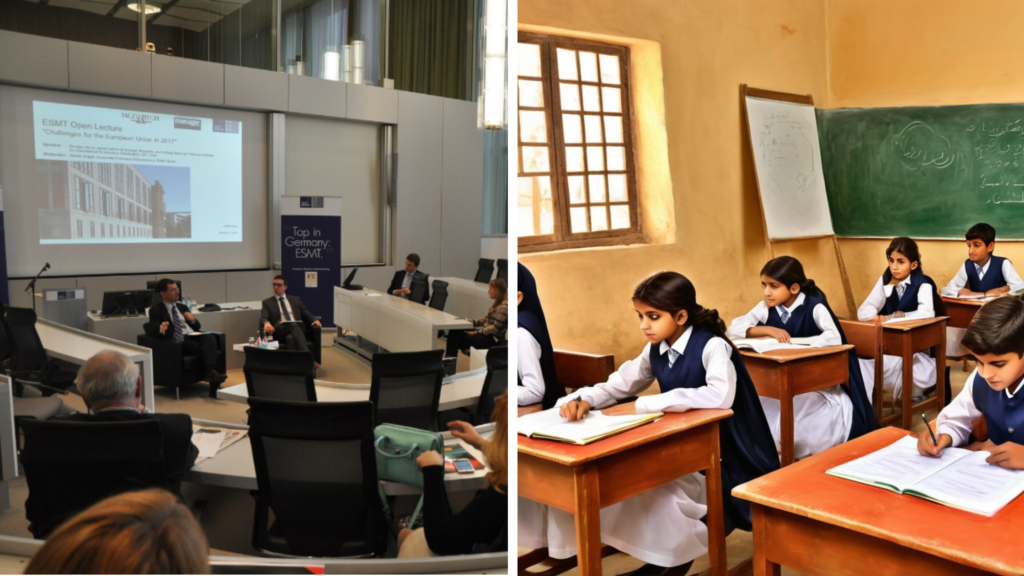Discover the academic culture shock Pakistani students face when studying in Germany. Learn key differences in learning styles, grading systems, and professor expectations to prepare for success.
The acceptance letter arrives, and suddenly dreams of studying in Germany feel within reach. Friends and family celebrate, social media fills with congratulations, and conversations buzz with excitement about new adventures ahead. Yet while everyone focuses on lifestyle changes like weather, food, and public transport, there is something far more significant that rarely gets proper attention.
Academic culture shock.
This is not simply about learning German or mastering public transportation. The entire approach to studying, learning, and thinking about education in Germany differs fundamentally from everything students know in Pakistan. The reality is that most students are not prepared for this transition.
Table of Contents

The Reality Check: Pakistani vs German Academic Systems
Back home in Pakistan, teachers function like academic GPS systems. They guide students step by step, share their notes, remind about deadlines, and essentially provide constant support through the learning process. This creates a safe, structured, and predictable environment.
Now imagine walking into a German lecture hall where the professor says, “Here is your reading list. See you at the exam”. No daily homework checks, no constant reminders, no safety net. Just students, textbooks, and complete academic freedom.
Sounds terrifying? It can be. But it is also incredibly empowering once students master the approach.
Welcome to Academic Independence: The German Way
German universities operate on a simple principle: students are adults, so they should act like adults. This means managing personal study schedules, choosing what to focus on, and taking full responsibility for learning outcomes.
In Pakistan, if a student missed class, someone probably filled them in. In Germany, if lectures are skipped, students discover what they missed during the exam. The system trusts students to make smart decisions, but it also expects them to live with the consequences.
This independence extends beyond just studying. Students will be writing research papers from day one, not just in their final year. They are expected to read academic journals, form their own opinions, and defend their arguments with solid evidence. It feels like being thrown into the deep end of critical thinking.

Understanding the German Grading System: A Complete Mindset Shift
Remember celebrating when scoring 85% on a test back home? In Germany, that mindset needs a complete overhaul. The grading system runs from 1.0 (excellent) to 5.0 (fail) according to DAAD. and getting a 2.3 is actually something to be proud of.
This is not about the numbers being different. It concerns the entire philosophy of assessment. German universities do not believe in giving students multiple chances to prove themselves. Instead of five quizzes, three assignments, and two midterms, there might be just one final exam that determines the entire grade.
No pressure, right?
Key Differences in Assessment Methods
- Pakistan: Multiple small assessments throughout the semester
- Germany: One or two major evaluations per course
- Pakistan: Continuous feedback and grade recovery opportunities
- Germany: High-stakes, final assessments with limited retake options
Professor Relationships: Formal but Fair Communication
Students accustomed to calling teachers “Sir” or “Madam” and chatting with them casually after class might find German academic etiquette surprisingly formal. They will be addressing professors by their full titles, writing carefully structured emails, and scheduling official office hours for discussions.
But here is the important point: once students adapt to this formality, they find German professors incredibly helpful and fair. They value students who come prepared with specific questions and genuine curiosity. The respect is mutual, but it builds on professionalism rather than personal relationships.

Research Culture: From Information Gathering to Knowledge Creation
In Pakistan, research often meant copying information from different sources and presenting it nicely. In Germany, research means questioning existing ideas, building on previous work, and contributing something new to the conversation.
Students will be reading academic papers that challenge their thinking, learning to cite sources properly, and writing essays that require original analysis. It is intellectually challenging but also incredibly rewarding when students start seeing themselves as creators of knowledge rather than just consumers.
Essential Research Skills for German Universities
- Critical analysis of academic literature
- Proper citation and referencing techniques
- Original argument development
- Evidence-based writing
- Independent research methodology
The Freedom That Initially Feels Overwhelming
Nobody will track attendance. Nobody will remind about deadlines. Nobody will chase students for assignments. At first, this freedom can feel overwhelming, like being lost in an ocean without a compass.
But here is what happens over time: students develop incredible self-discipline, time management skills, and academic maturity. They learn to trust themselves, manage their priorities, and take genuine ownership of their education.
Social Life: Your Academic Support System
Contrary to what students might think, German university life is not all about studying in isolation. Universities have vibrant student communities, international societies, and cultural events that help connect with others and decompress from academic pressure.
Joining these communities is not just about making friends. It concerns building a support network that helps navigate academic challenges while maintaining mental health and cultural identity.

Preparing for Academic Success: The Growth Mindset Approach
Academic culture shock is real, and it hits harder than jet lag. Students might feel lost, overwhelmed, or even question their abilities during the first semester. That is completely normal.
The key is understanding that this discomfort is temporary. Every Pakistani student who has successfully studied in Germany has gone through this exact same transition. The difference between those who thrive and those who struggle is not intelligence or preparation. It is a mindset.
Students need to embrace the discomfort, be patient with themselves, and remember that they are not just changing countries. They are evolving as learners, thinkers, and individuals.
Practical Preparation Steps
- Develop independent study habits before departure
- Practice academic writing in English
- Learn time management without external pressure
- Build research skills through online courses
- Understand German academic expectations through preparation programs
Overcoming the Academic Culture Shock: Your Path Forward
So how do students prepare for something this different? Start by shifting mindset from passive learning to active engagement. Practice reading academic texts critically. Learn to manage time without external pressure. And most importantly, develop confidence in the ability to learn independently.
The academic culture shock is challenging, but it is also transformative. German universities do not just give students a degree. They provide the tools to think critically, work independently, and contribute meaningfully to their chosen field.

FAQs
What is academic culture shock, and why is it important for Pakistani students in Germany to understand it?
Academic culture shock refers to the challenges international students face when adjusting to a new education system. For Pakistani students in Germany, this includes adapting to independent learning, fewer assessments, formal professor relationships, and a different grading scale. Understanding these differences helps reduce stress and improves chances of academic success.
How is the German academic system different from Pakistan’s?
The German system emphasizes independence, critical thinking, and personal responsibility. Unlike in Pakistan, students are expected to manage their schedules, attend lectures voluntarily, and often pass based on a single final exam. Professors offer less day-to-day guidance, expecting students to be self-motivated and resourceful.
What challenges do Pakistani students commonly face during their first semester in Germany?
Common challenges include struggling with self-discipline, feeling overwhelmed by academic freedom, misunderstanding grading scales, and adjusting to formal communication styles with professors. Many students also initially find it difficult to transition from passive to active learning.
How can I prepare for academic life in Germany before arriving?
Start building independent study habits, practice academic writing in English, take online courses on research and citation, and learn about German academic expectations. Joining orientation programs or consulting academic counselors can also provide a strong head start.
Ready to Make the Leap? Get Professional Support
If feeling overwhelmed just reading about these differences, imagine how it feels when actually living them. But here is the good news: students do not have to figure it all out alone.
Understanding these cultural differences is the first step toward academic success in Germany. With the right preparation, mindset, and support, students will not just survive the transition. They will thrive in it.
The question is not whether students can handle the academic culture shock. The question is: are they ready to grow through it?
Ready to transform your academic journey? Our expert career counselors at AccessFuture specialize in helping Pakistani students prepare for German university success. From understanding academic expectations to mastering visa interviews, we provide comprehensive support every step of the way.
[Book Your Career Counseling Session Today →]
[Prepare for Your Visa Interview →]
Your German academic journey awaits, and with proper preparation, it will be worth every challenging moment.











